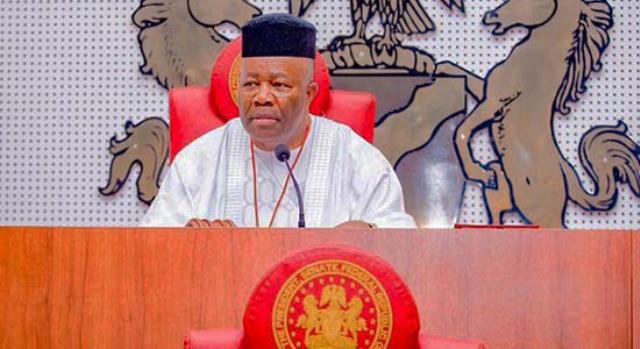Headlines
JUST IN: Senate Grants Approval for Tinubu’s ₦1.77 Trillion Loan Request

The Senate has given the green light to President Tinubu’s ₦1.77 trillion loan proposal, focusing on boosting Nigeria’s infrastructure and economy.
The Senate has approved President Bola Tinubu’s request for a ₦1.77 trillion ($2.2 billion) loan following a voice vote that supported the proposal.
The Senate, led by Deputy Senate President Barau Jibrin, approved the loan following a report presented by Senator Wammako Magatarkada (APC, Sokoto North), who chairs the Senate Committee on Local and Foreign Debts.
The President’s request submitted on Tuesday is part of a new external borrowing plan aimed at partially financing the N9.7 trillion budget deficit for the 2024 fiscal year.
On Tuesday, Tinubu submitted a request to the National Assembly for approval of a new external borrowing plan amounting to N1.767 trillion, equivalent to $2.209 billion, as part of the 2024 Appropriation Act.
The new loan is projected to increase the Federal Government’s spending on debt servicing. According to a recent statement by the Central Bank of Nigeria, it cost $3.58 billion for the government to service foreign debt in the first nine months of 2024.
According to the CBN report on international payment statistics, this amount marks a 39.77% rise compared to the $2.56 billion spent during the same period in 2023.
The report indicates that the largest monthly debt servicing payment in 2024 happened in May, totaling $854.37 million, whereas the peak monthly expenditure for 2023 was recorded at $641.70 million in July.
READ ALSO: FG Launches N75bn Loan Disbursement for MSMEs to Boost Growth
The pattern in the CBN’s handling of foreign debt underscores Nigeria’s increasing expenses related to fulfilling its debt obligations.
A detailed analysis of international debt figures revealed a significant rise in January 2024, with debt servicing costs escalating by 398.89 percent to $560.52 million from $112.35 million in January 2023. Conversely, February experienced a modest decrease of 1.84 percent as payments dropped from $288.54 million in 2023 to $283.22 million in 2024.
In March, payments decreased by 31.04 percent to $276.17 million from $400.47 million during the same period last year. However, in April there was a substantial increase of 131.77 percent, with payments rising to $215.20 million in 2024 compared to $92.85 million in 2023.
In May 2024, the debt servicing payment reached its peak with an expenditure of $854.37 million, marking a significant increase of 286.52% compared to the $221.05 million spent in May 2023. Conversely, June experienced a decline of 6.51%, as payments decreased from $54.36 million in 2023 to $50.82 million in 2024.
In July 2024, payments decreased by 15.48 percent to $542.50 million from the previous year’s total of $641.70 million in July 2023. The downward trend continued into August with a reduction of 9.69 percent, as payments fell to $279.95 million compared to $309.96 million in August 2023. However, September brought positive news with a significant rise; payments increased by 17.49 percent to reach $515.81 million from last year’s amount of $439.
Amidst increasing exchange rates, the data highlights concerns regarding the intensifying pressure of Nigeria’s foreign debt commitments.
